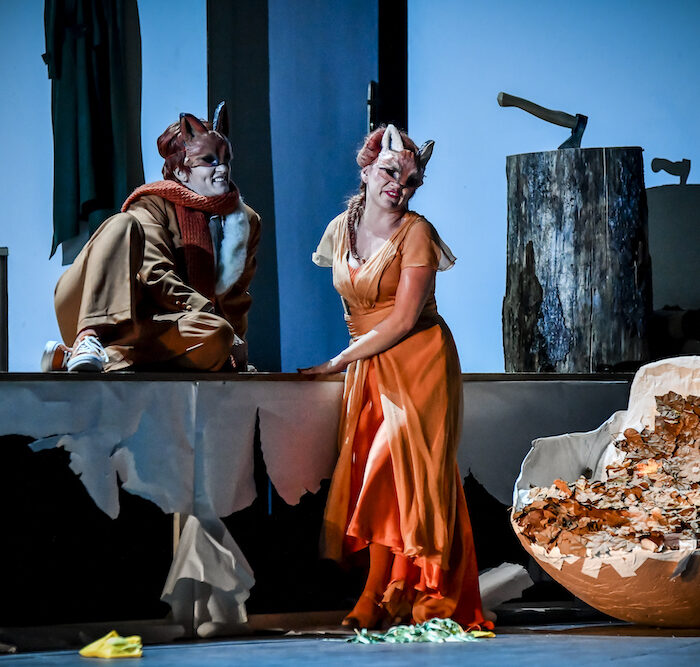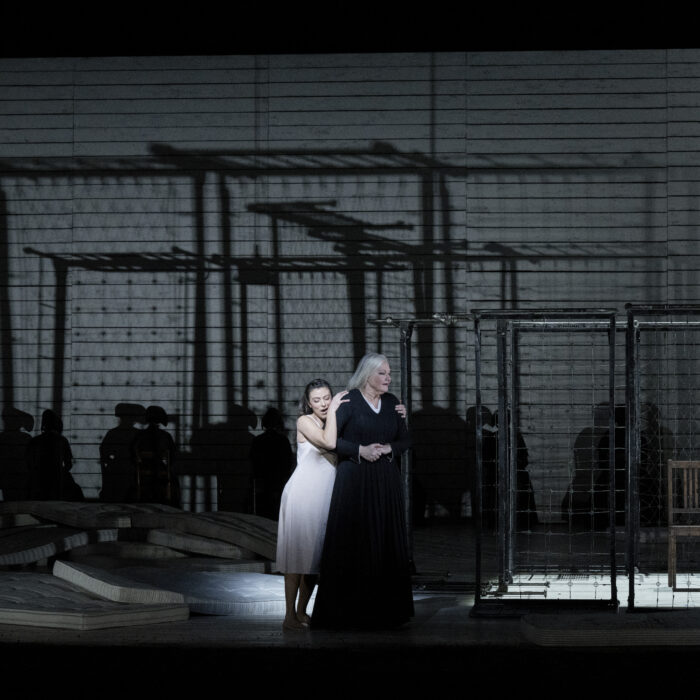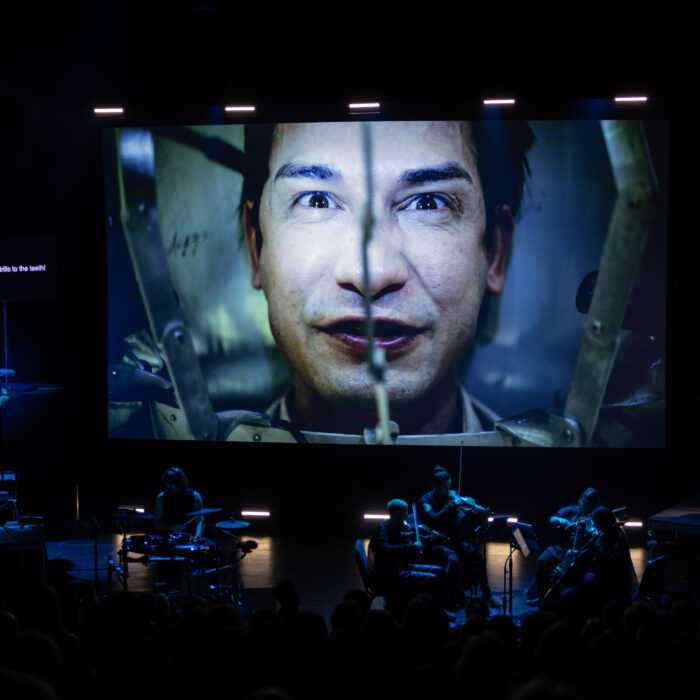
Opéra National de Paris 2019-20 Review: Madama Butterfly
Robert Wilson’s Production & La Bastille’s Questionable Acoustics Overpower Singers
By Mauricio Villa(Credit: Svetlana Loboff / Opera National de Paris)
On Sept. 14, 2019, the Paris Opera presented “Madama Butterfly” at the Bastille. One of the most beloved and famous operas of all time, it seemed like a very good choice to open a season.
But what should have been a wondrous event was derailed by two factors: Robert Wilson’s production and the sonority and acoustics of La Bastille.
When Boredom Sets In
Robert Wilson’s production of “Madama Butterfly” opened at Paris Opera in 1993, and it seems as fresh and new as ever. The American director has created his own school, greatly influenced by the Japanese Kabuki theatre and contemporary dance. He focuses his creations on the absence of sets, very few props, strong defined lighting, and the use of shadows with clearly defined and choreographed movements of the singers. Wilson is the “King” of the experimental theatre in the United States and a very proclaimed opera director worldwide. “Madama Butterfly” is a title that suits Wilson’s conception quite well. It breathes the old Japan of the Geishas in every movement and scene.
The stage is complete bare where only the floor is visible: there is a big square which simulates the house of Butterfly and the rest of the floor simulates a rocky landscape. The only prop used is a strangely designed chair which is brought in and out for several scenes. All the singers walked in the false Egyptian profile (chest and arms facing the front while the head and feet face the direction they are looking or moving towards) and have clearly defined movements of the arms.
All other props which appear during the action are mimed: like the glasses used by Pinkerton and Sharpless, the objects that Butterfly brings the wedding day. Even the dagger used by Butterfly to kill herself. If you are a fan of Wilson’s work you will be excite; if you are new to opera or prefer more traditional staging, you will be bored and disappointed. There are photographic moments of extreme beauty, such as Butterfly’s entrance or when she throws Goro away from her house with all of the lights going off except a strong white light focused on the fist of Butterfly.
Of course, you have to give credit to all the artists on stage for the mammoth undertaking that is learning this choreography. There is no denying the virtuosity of that work. But in the end, the show was so slowly paced that boredom would set in at times and it became more convenient to simply close your eyes and let the music do the work. You feel like after 20 minutes, you’ve seen it all.
Overpowered by the Orchestra
Ana Maria Martínez sang the title role, which she has dominated all over the world. Her timbre resembles a lyrical-spinto soprano voice with a dark, round sound and with a fair vibrato. She has an amazing ability to diminuendo to pianissimi sounds, as she proved on her high B flat at the end of her entrance, or her exquisite mezza voce while singing the phrase “Vogliatemi bene” in Act one and “Quando fa la nidiata” in Act two.
Her interpretation of her famous aria “Un bel dí vedremo” was very moving. She began singing softly before building to a soaring G flat and gaining intensity throughout the aria. However, her high B flat could not surpass the orchestra’s fff ( as it is mark on the score) leaving her sound lost and small at the climax. And this went on like this during the whole performance with the voice overpowered by the larger ensemble’s biggest outbursts.
She seemed very determined and dramatic during the phrase “Ah! m´ha scordata” when the orchestra was at its softest. She gave herself completely over to her death scene and utilized a beautiful diminuendo on the high A during the phrase “O a me sceso dal trono.” This is often sung forte, but the effect was breathtaking.
Acting-wise, she did her utmost to kill herself with an invisible dagger in this final scene, even if the choreography of her death was rather unnatural. If there was anything that did not quite work in this interpretation was the shift from Butterfly as a 15-year-old to a mature woman three years later. You never quite got the feeling of a young girl during that first Act; no doubt the choreography impacted this.
Mixed Results
Giorgio Berrugi sang the treacherous lover Pinkerton. His timbre is pleasant and he has a strong sense of legato. However, more than any other singer on this night, his voice was easily overpowered by the orchestra. One might surmise, based on this, that the role is even a size too big for his voice. Pinkerton is a lyrical role and he must sound young and vigorous. However, every single time that Pinkerton is tasked with ascending to a high B (and his part has many) the orchestra is always at its loudest. But for Berrugi every one of these challenges proved too great for him. The audience expressed its disappointment at the close of the night.
Sharpless was interpreted by the famous bass-baritone Laurent Naouri. His voice sounded cold and distant at the start. The high G in the first passage he sings proved a major challenge that he wasn’t quite up to the task for but he gained volume and security during his duet with Pinkerton, and was totally in control in his duet with Butterfly in Act two. He is a very good actor that, even through the cold rigidness of the staging, could imbue his character with the doubts, disappointment and sadness he confronts in his interactions with Butterfly.
The wonderful contralto Marie-Nicole Lemieux took on the role of Suzuki. She was the only member of the cast (along with Robert Pomakov as Lo Zio Bonzo) whose voice was amply heard over the orchestra. She has a dark, big resonant voice which she managed to control during her duet with Butterfly, employing long legato pianisimo phrases. She was very strong and dramatic in her “piangerà tanto, tanto,” capping it all with a thunderous high G.
The rest of the cast did the best they could given the circumstances. Rodolphe Briand, who performed Goro, sounded particularly distant even in his first intervention with Pinkerton when the instrumentation is not quite heavy. As noted, Canadian bass Robert Pomakov managed to project all the rage and fury that his short intervention demands. He managed the three high Fs splendidly.
The work of the chorus and orchestra of the Opéra national de Paris under the baton of Giacomo Sagripanti were also commendable. The maestro was inclined toward quick tempi, clearly marking the oriental style of the score, and big outbursts of fortes during the several dramatic moments of the opera.
Once again, it is hard to determine if the inaudible nature of the performance was the result of poor casting or the theater’s own imbalances. Nonetheless, it was an uncomfortable experience watching an opera under those conditions. The audience loved Wilson’s work as he received a standing ovation when he took the final curtain call.



